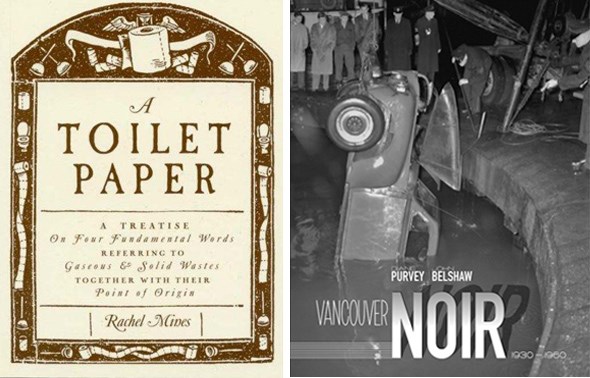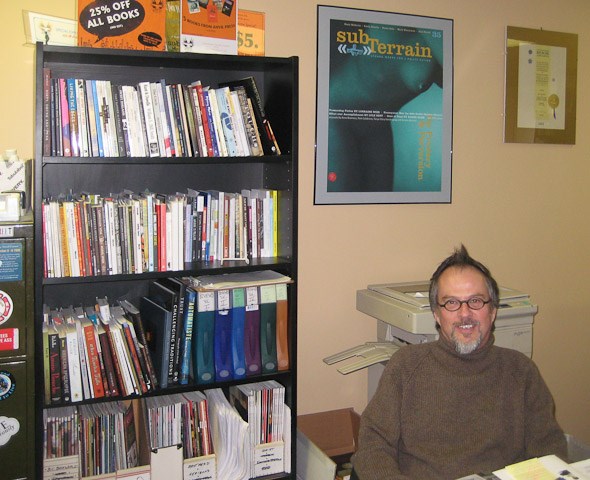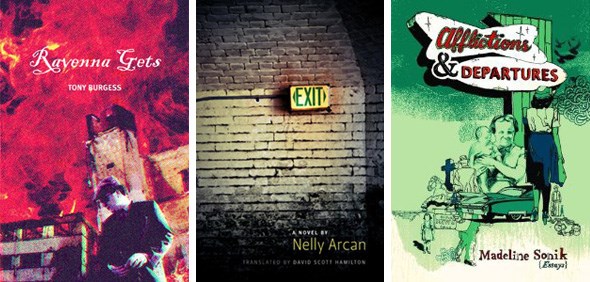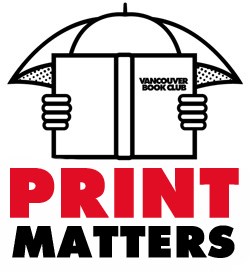In 1991 Brian Kaufman received a slim volume on waste called A Toilet Paper, or, A Treatise on Four Fundamental Words Referring to Gaseous and Solid Wastes Together with Their Point of Origin. At the time he was publishing subTerrain, which he had founded in 1988, and this little book was the opportunity the magazine had been looking for. Anvil Press had been formed to publish subTerrain but they hoped to become fuller supporters of literary up and comers; specifically, "contemporary Canadian literature with a distinctly urban twist."
What was the impetus for starting Anvil Press?
Brian: I formed Anvil as the publishing company of subTerrain magazine – I wanted to do books but I didn't know how that was going to happen. Once I found out how magazines were funded, I thought we have to make subTerrain a non-profit organization and we separated the two [in the '90s]. I wanted to do a magazine that had a little more edge, a little more grit, a little more from the street than a lot of the magazines and their tenor that I encountered at the time that were mostly university and college journals. They've morphed a lot over the years too, but they used to seem to me very incestuous in the fact that they published a lot of the people that taught there or other profs, and it was hard for younger writers to get into those venues. So that was the initial idea, the play on the word "subterrain," it was a little underground.
Karen: Plus, you couldn't find a job in publishing.
 The book that started it all (left) and Vancouver Noir (right), one of Anvil Press's most recent offerings.
The book that started it all (left) and Vancouver Noir (right), one of Anvil Press's most recent offerings.
B: It's funny, we share offices with Talon now, I remember going to Talon's old offices on Cordova, down by the sugar refinery in an old warehouse, and talking to them and really things haven't changed much: Karl [Siegler, Talon's recently retired president and publisher] was there and Mary Schedlinger was editing there at the time. They didn't have any openings, they said, "we kind of have to do everything in house, there aren't any jobs."
I went to Pulp [Arsenal Pulp Press], I actually volunteered with Pulp for a very short time and it was kinda the same thing. Brian Lam was just starting there and, like, two other people.… So that's the choices you have. If there's no jobs or no way to get into it, what are you going to do? And that's how a lot of [small presses] have started up, over the years, is usually a group of writers getting together and saying “screw it, let's just to it.”
Thus the Anvil symbol?
B: Yeah, sort of. It was a worker symbol, right, for forging something into being, a proletarian. I can't say more...sounds good too, especially when you hit it. I didn't know at the time, there's another Anvil in England [Anvil Press Poetry].
K: We get emails for them all the time.
B: I don't know why people don't find them, they find us so much easier.
K: They probably get emails for us too occasionally I'm sure.
B: I met [the founder] at a book fair once and he seemed slightly miffed; “Oh yeah you.”
Can you give us a taste of Anvil in the beginning? A story of a publisher starting out?
B: When you're starting something you should be optimistic and a bit of a dreamer, but we purchased a printing press...
K: I don't think I've even heard this story.
B: ...and thought, we'll print the poetry books ourselves and that will save a lot of money. They weigh a tonne and you have to know what you're doing – we actually did know a printer who could do it. It's a nightmare story of trying to get the thing into the truck and moved in the pouring rain. Just a nightmare – the thing's top heavy, [we had] fears of someone getting their legs chopped off.... It seemed good in the plan, but you have to keep a press running regularly. If they sit there then everything slips out of position and someone has to tune it up. We did do two issues of the magazine, but they weren't the greatest quality.... Where did that wind up? At Tom Snyder's? I think he owes us a couple hundred dollars.
 Anvil Press founder and publisher Brian Kaufman. Photo by Maegan Thomas
Anvil Press founder and publisher Brian Kaufman. Photo by Maegan Thomas
As a more mature press, have you been able to maintain that focus on up and coming writers, that underground flavour? How do you survive?
B: For the most part. The more you work in any business, it's fine tuning and developing and especially in the cultural industry, I think, you have to find ways of surviving. So to be a purist, and some are, it's much harder if you say "I'm going to do the hard experimental literary stuff and I'm not going to do anything else because that's what I think is important." But that's a hard sell, or just doing strictly poetry is a hard sell. If you look closely at all the publisher's catalogues you'll see the balance they're trying to work out. An example, in Toronto, is ECW press: they started out purely literary and now they've got a whole line of sports books and celebrity biographies and books on the wrestling craze.
K: But they still do the literary books too.
B: It's a way of generating revenue so you can do the strange, experimental [works].
K: Sometimes you can make money on those books, and sometimes you can make money on the literary ones too.
B: There's no guarantee [the non-literary] books will sell either.
K: There's no guarantee on any of them. That's one I thing I find: you try to guess which ones will be the big sellers and 75% of the time you're wrong. It's something that you didn't even think was going to take off does and the one we were so sure about doesn't get the traction. Which makes it exciting.
What are some big surprises you've had?
B: We had one this year that was like that, a non-fiction book about a woman, a memoir, The House with the Broken Two [by Myrl Coulter]. It's about giving up her first child at the age of 16 for adoption and then 30 years later tracking down her son and finding him. And that's not an uncommon story, or odd, but there's a lot of people would be interested in it. So we thought it would do alright...
K. And it's doing amazing for a first book, it's doing really well. And she's been getting invited to festivals and things, while other authors that have been around a long time may have trouble getting invites to festivals. It makes it exciting – you just don't know how the public or the media or the festivals are going to react. Or if they are going to react at all. [laughs]
B: And Tony Burgess' novella [Ravenna Gets], that we published, is a strange little book. He won the ReLit award in the short fiction category. That probably doesn't result in a lot of sales, but it's the kinda book that people could have just said, oh that's weird, and that would be the end of it.
K: It's not a mainstream book.
B: But that's the stuff we wanna do, that's important for either what they are doing with form, or writing or the voice...
K: Or they're going to an uncomfortable place that a lot of people don't want to go.
B: So over the years, we started off just doing or wanting to do that kinda stuff and having to look at making a little bit of money over the years – we haven't gone as far, no wrestling, no cookbooks. It's more in the non-fiction where we are doing what we didn't before, interesting cultural books.
K: That are still within the mandate...
B: Yeah. Most of our non-fiction is about Vancouver. I'm a Vancouverite, I have an interest in the history of Vancouver.
 Some of Anvil's most recently acclaimed books
Some of Anvil's most recently acclaimed books
Anvil Press recently celebrated their 20th anniversary. What's your overall feeling on your twenty years? Oh, and how was the party?
Brian: It is great to have made it to twenty in an industry that is fraught with challenges, change and upheaval. It has been a roller coaster ride and we are rocketing forward and ready for another twenty! There are so many people to thank – the authors, the folks that have helped out along the way – and many of them were there at the 20th anniversary party and that was amazing. Old and new friends, it was a great night.
Karen: It's wild to be twenty. Although, [it's different being] out of our teens. "You can't be twenty on Sugar Mountain." Many new and old friends were at the Anvil 20th party, as well as many Anvil authors: Dennis E. Bolen, Teresa McWhirter, Jim Oaten, Janis Harper, Bryan Wade, Catherine Owen, Jenn Farrell, Bob Robertson, John Belshaw, Diane Purvey, Calvin Wharton, and Michael Barnholden. The two who made it to the very end were Jamie Reid and Calvin Wharton, poets of course! (Jenn Farrell and Rob Hughes were a close second.)
How is Anvil Press participating in the e-book movement?
K: It's not our high priority but...
B: We've digitized about half our back list.
K: There's a project through the ACP [Association of Canadian Publishers] that made it a lot easier to do that, it's a group project. I don't think we would have done anything if we were by ourselves. But they help us and get [the digital copies] placed. And there was a subsidy. We haven't touched poetry; some people have, but we haven't because of line breaks etc. Nor our highly illustrated texts. It's just fiction and straight text non-fiction.
B: Plus, I'm not a big advocate of the e-book. It's not “book.”
K: As the person who works on the marketing side, I feel much more passion for the actual book than the e-thing, but if our readers, if some of them want it that way, we're gonna give it to them that way. I do think there's going to be a market for the actual book.
B: Consumers will decide.
K: The kind of press that we are, I don't see the book version disappearing. The bigger publishers that do a lot more mass market stuff will be more affected.
B: It could look okay on a reader once they get to a point...what bothers me most about current readers is that they can't maintain the aesthetic of the actual typesetting.
What are your impressions of the Vancouver literary community?
B: It's amazingly strong and healthy in Vancouver.... Ultimately we are all trying to promote the health of writing in Vancouver.
K: We're all on the same team, or should be....I think the publishing community, locally, is a very friendly community that helps each other, but there's also friendly competition that way. I find the BC publishing community is very nice to each other and shares valuable information. There's friendly competition over books and authors for sure.
B: I've had calls from other publishers saying, “We're thinking of doing this book from so and so and I know you've published her before, do you have a problem with that?” and I've done the same thing.
K: We all have our little niches but we cross over. We do sometimes send authors to each other too, because we might get something great but it's not an Anvil Press book. You should go try so and so and we'll give that publisher a heads up.
What are your next steps? Any predictions for the Vancouver literary scene in 2012?
B: Well, we have some wonderful books coming out this year: Five Little Bitches, a new novel from local Teresa McWhirter; absurdist, fabulist stories from Nova Scotia writer Elaine McCluskey; new volumes of poetry from Patrick Friesen and Stuart Ross; a follow-up novel from Annette Lapointe and a few surprises we can't yet talk about!
As to the scene and trends, well...who knows, right? Vancouver has so much literary activity going on that I am always expecting to be surprised and astonished by something/someone new. So, whether you like your words on paper or on a glowing tablet, keep your eyes peeled, for I am sure there will be many splendid works coming our way in 2012.
K: Yikes, it's always hard to predict, but we had a great 2011 - many accolades for our authors. I would hope for more of the same! ...The literary scene in Vancouver seems to get more and more bustling and vibrant each year, not just more writers, but more people interested in organizing writing and publishing events, writing about books, etc. There appears to be a lot of interest in Vancouver's writers and books as well as guests from afar. It's uplifting and exciting.... The only negative is the loss of great bookstores in the city. I hope we can support the remaining ones and maybe see new ones emerge, as well as other venues for books.



